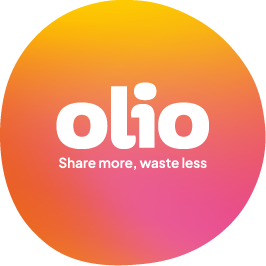

Olio Exchange Limited

London Borough of Hammersmith and Fulham, United Kingdom
September 2022
Software publishing and SaaS platforms
Service with Minor Environmental Footprint
Argentina,
Chile,
Ireland,
Mexico,
Singapore,
United Kingdom
Olio connects neighbours with each other and with local businesses so surplus food can be shared, not thrown away. This could be food nearing its use-by date in local stores, spare home-grown vegetables, bread from your baker, or the groceries in your fridge when you go away. For your convenience, OLIO can also be used for non-food household items, too. Here at OLIO we believe that small actions can lead to big change. Collectively – one rescued cupcake, carrot or bottle of lotion at a time – we can build a more sustainable future where our most precious resources are shared, not thrown away. We have a responsibility to practise what we preach, too, which is why we take the steps to ensure OLIO is run as sustainably as possible. OLIO is currently carbon negative (which means we remove more carbon from the atmosphere than we generate), and we were recently awarded a B Corp certification for maintaining a high standard of social and environmental performance. By empowering local communities with a free, accessible, and effective solution to reduce waste, we are confident that we will be able to have a lasting, meaningful impact on the world one share at a time.
Overall B Impact Score
Governance 21.1
Governance evaluates a company's overall mission, engagement around its social/environmental impact, ethics, and transparency. This section also evaluates the ability of a company to protect their mission and formally consider stakeholders in decision making through their corporate structure (e.g. benefit corporation) or corporate governing documents.
What is this? A company with an Impact Business Model is intentionally designed to create a specific positive outcome for one of its stakeholders - such as workers, community, environment, or customers.
Workers 31.5
Workers evaluates a company’s contributions to its employees’ financial security, health & safety, wellness, career development, and engagement & satisfaction. In addition, this section recognizes business models designed to benefit workers, such as companies that are at least 40% owned by non-executive employees and those that have workforce development programs to support individuals with barriers to employment.
Community 11.2
Community evaluates a company’s engagement with and impact on the communities in which it operates, hires from, and sources from. Topics include diversity, equity & inclusion, economic impact, civic engagement, charitable giving, and supply chain management. In addition, this section recognizes business models that are designed to address specific community-oriented problems, such as poverty alleviation through fair trade sourcing or distribution via microenterprises, producer cooperative models, locally focused economic development, and formal charitable giving commitments.
Environment 7.1
Environment evaluates a company’s overall environmental management practices as well as its impact on the air, climate, water, land, and biodiversity. This includes the direct impact of a company’s operations and, when applicable its supply chain and distribution channels. This section also recognizes companies with environmentally innovative production processes and those that sell products or services that have a positive environmental impact. Some examples might include products and services that create renewable energy, reduce consumption or waste, conserve land or wildlife, provide less toxic alternatives to the market, or educate people about environmental problems.
Customers 22.9
Customers evaluates a company’s stewardship of its customers through the quality of its products and services, ethical marketing, data privacy and security, and feedback channels. In addition, this section recognizes products or services that are designed to address a particular social problem for or through its customers, such as health or educational products, arts & media products, serving underserved customers/clients, and services that improve the social impact of other businesses or organizations.
What is this? A company with an Impact Business Model is intentionally designed to create a specific positive outcome for one of its stakeholders - such as workers, community, environment, or customers.